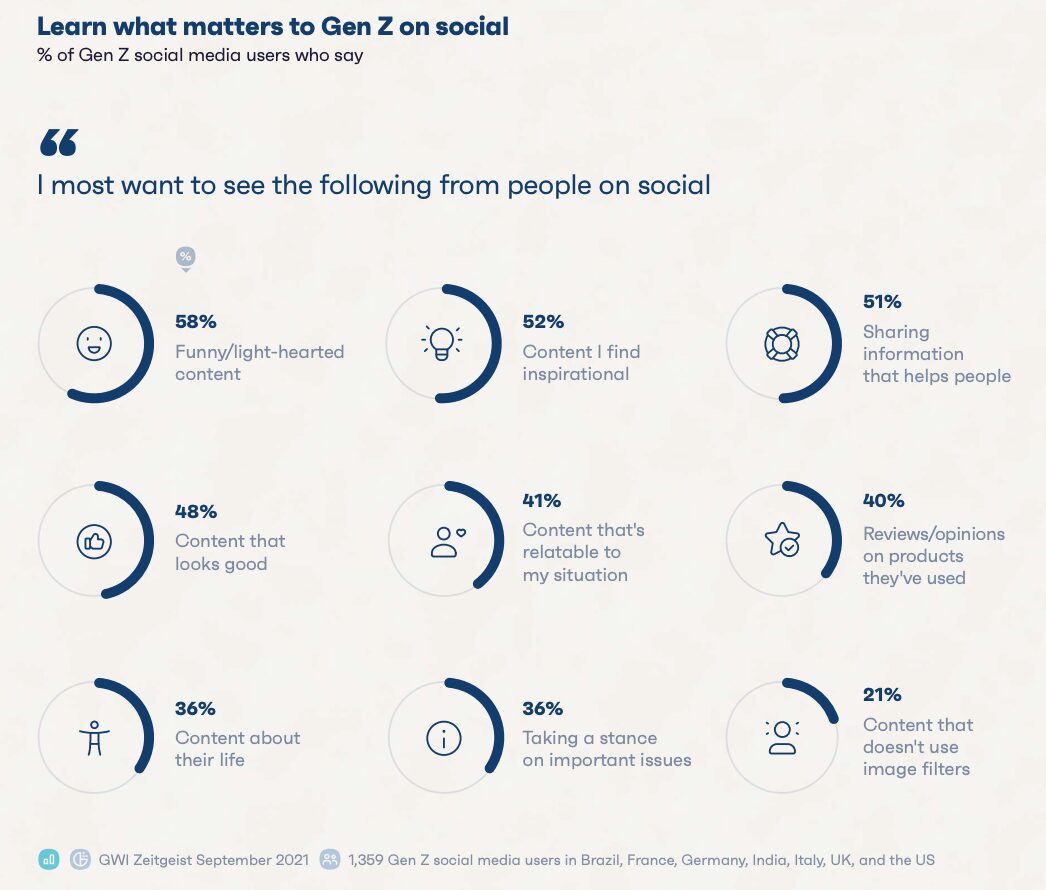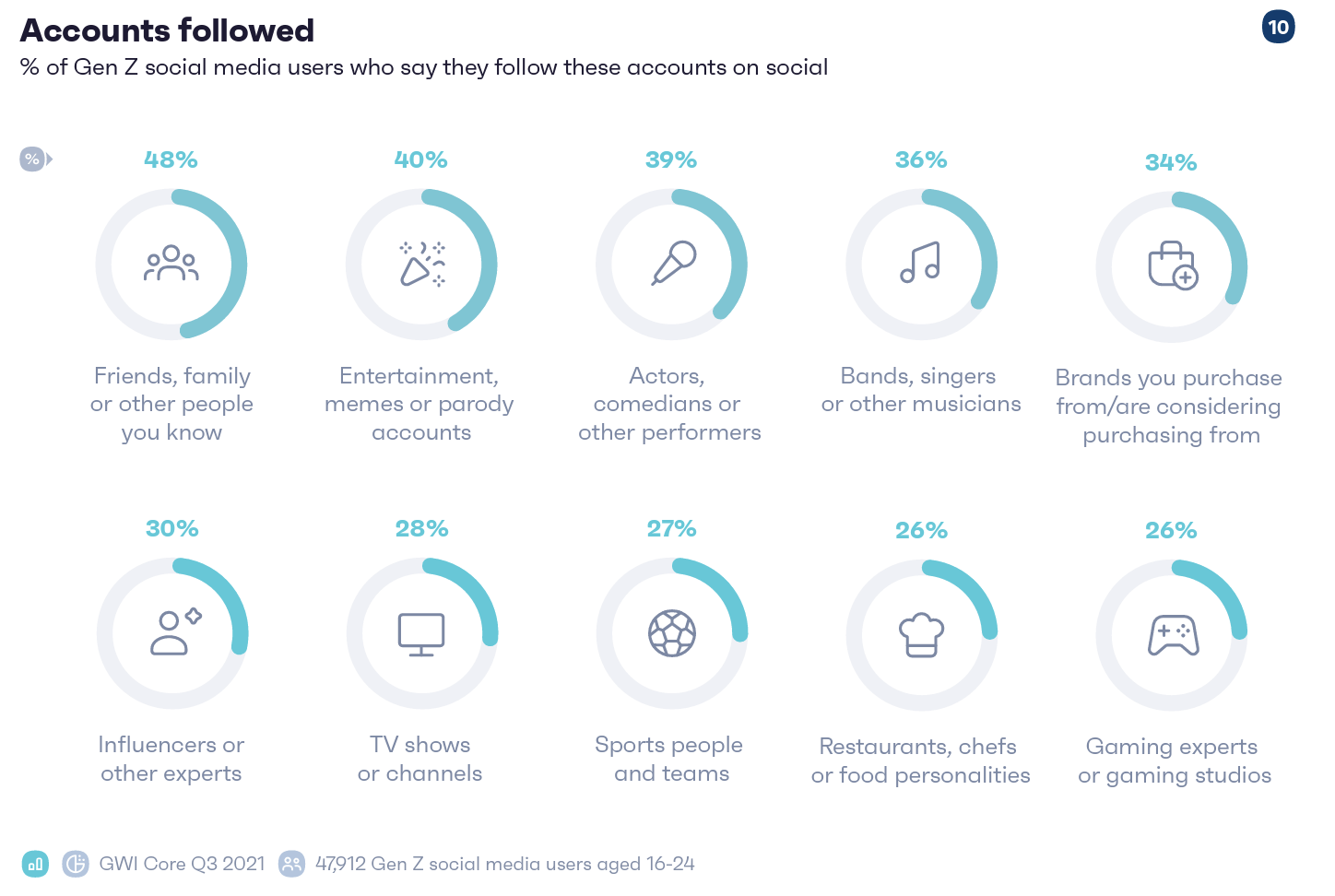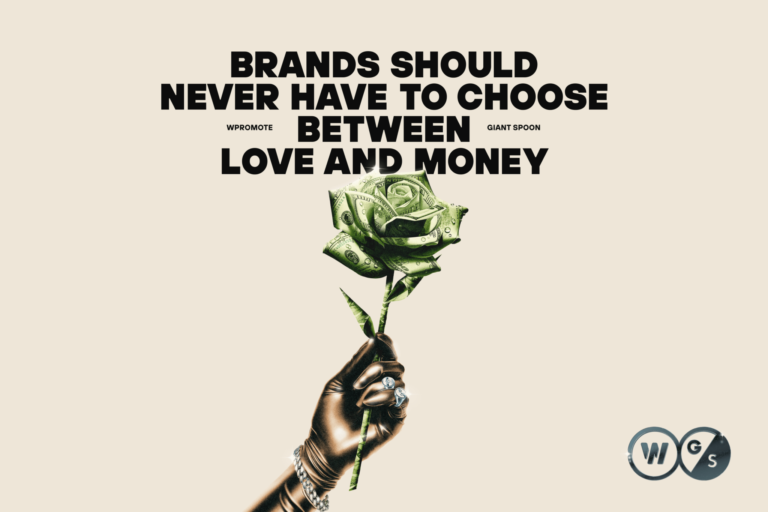For many brands, capturing Gen Z’s attention can still seem like the white whale of marketing—and that’s before we get to the question of how to actually convert them into customers. But why do marketers insist on looking at Gen Z as somehow fundamentally alien, even when compared with millennials? On paper, they look much closer to what might be termed an ideal customer in our digital-centric age: resolutely digital-first, open to engaging brand experiences, perennially online. There are two potential flies in the ointment: first, marketers have gotten too comfortable spending money on the platforms they’re most comfortable with, particularly millennial stalwarts like Instagram and Google. They know how marketing “works” on those platforms (even if that is changing), and they aren’t necessarily the channels Gen Z is using to get information. The second is a little harder to define, but could be characterized as a real knowledge gap when it comes to what actually motivates Gen Z to buy. They aren’t looking for the same things from brands that boomers, Gen Xers, or even millennials are. What they’re looking for are brands that feel authentic, are investing in building meaningful connections with an audience, and build trust by aligning with their values.
Gen Z is driven by a need for authenticity—but what does that mean for marketing?
When Instagram was new, brands quickly embraced the platform as a new, more “real” way to connect with consumers by inviting them behind the scenes and letting them get to know a less polished version of the brand and the people behind it. But that soon gave way to the Instagram of today; highly curated and optimized for as much ad placement as a mobile app can possibly contain. Gen Z has largely turned away from that version of social media in favor of something that feels more raw and less polished. Their preferred social channels are TikTok, Snapchat, and BeReal, where more “authentic” content reigns supreme. That fundamental difference in aesthetic and approach also comes with less developed ad capabilities around targeting and attribution (in BeReal’s case, a completely turn away from any advertising at all). That’s a tough sell to established brands, even if they’re seeing performance drop in traditional channels. The push for authenticity doesn’t mean that Gen Z is allergic to “brand content.” Quite the opposite; they’re used to engaging with brands all the time. But what they’re looking for from that brand content is different. GWI data indicates that the top three things that Gen Z wants to see on social media are funny/lighthearted, inspirational, and helpful content.

Authenticity isn’t just about the meat of the content; Gen Z also wants to see content that feels authentic in the context of the platform. That can be another pain point for brands that don’t want to invest in platform-specific creative for a channel like TikTok or are uncomfortable with the “authentic” aesthetic, which generally means videos or images look like it was shot on an iPhone and popped straight onto the platform. Brand assets that feel too sleek, polished, or fully branded are actually less likely to perform on a platform like TikTok. That’s why brands seek out creators to help them get Gen Z’s attention, drive engagement on the platforms, and power conversions, like this content from cringecarter and Dunkin Donuts.
@cringecarter Had to go on one last Dunkin’ run with the dad before I move✨❤️ #dunkinrun #drivethru #dunkiejunkie ♬ original sound – Carter
Connecting with Gen Z starts with getting their attention, but that’s not the whole story
One of Gen Z’s defining characteristics is that they’re nearly always online; most of the time that’s on a smartphone. eMarketer’s analysts forecast that Gen Z internet penetration in the US will hit 99.1% by 2024. They are hyperaware of the many social channels and entertainment options available, but they still only have so many hours in a day. So where are they spending all that time online? We know that short-form video platforms like TikTok and similar content features like Instagram Reels have exploded in popularity in recent years. We’ve already talked about authenticity as a factor in their appeal, but another might be length; IAB charted Gen Z’s average attention span at just 8 seconds (vs. the millennial average of 12 seconds). That means you have less time to grab their attention (pay attention to your content’s immediate hook!). But it also means it’s going to be harder to keep that attention, which is essential to building a meaningful connection. To make the most of their digital focus, it’s not enough to know where they are. You need to understand what they’re looking for and how they want to interact.

Traditional rules don’t necessarily apply on these story-focused platforms; creative variety is going to be crucial for keeping that connection alive for the long term. Don’t bombard Gen Z with the same kind of messaging over and over again; that just makes your brand easier to ignore in a digital world that is constantly bombarding people with marketing at every turn.
Trust is a key component in the Gen Z purchase decision, but you better bring receipts
Authenticity isn’t just about engagement for Gen Z; they’re also looking for evidence of a deeper commitment from brands. According to Edelman, 73% of Gen Z buy or advocate for brands based on their beliefs and values. Trust in your business is a critical part of the purchase decision. A great way to spark initial interest and then drive long-term loyalty from Gen Z is to put what your business actually stands for front and center, especially in upper-funnel and retention campaigns.

Brands can be afraid of going against the traditional advertising playbook, which generally advocates staying out of potentially polarizing political conversations. Marketers can also be overly aware of the potential of doing something wrong and seeing goodwill break bad. But don’t let that scare you off. Gen Z’s love affair with authenticity means they’re actually fairly forgiving if your brand commits to transparency. If you do make a mistake or slip up, it isn’t the end of the world: Edelman’s data also revealed that 71% of Gen Z consumers will stay loyal and advocate for brands they trust, even if they make a mistake. You just need to show that their trust hasn’t been taken for granted and is worth something. Be upfront about any mistakes or even failures instead of trying to hide an issue or bury negative press about your brand. if you get in front of potential problems and take responsibility in a forthright way, you can actually build a deeper sense of trust and loyalty out of a potentially damaging situation. Earning Gen Z dollars isn’t going to be easy in the current economy, but those challenges also represent an opportunity to show up for Gen Z in an authentic way and build up those connections in a time of great need. If you get it right, you could position your business for significant business growth.





